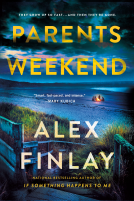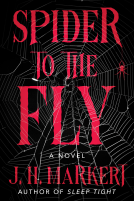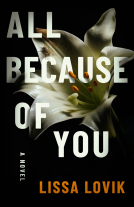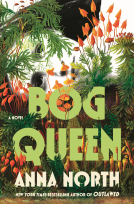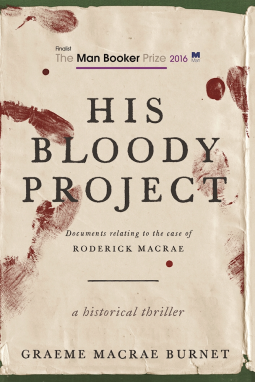
His Bloody Project
Documents Relating to the Case of Roderick Macrae (Man Booker Prize Finalist 2016)
by Graeme MaCrae Burnet
This title was previously available on NetGalley and is now archived.
Send NetGalley books directly to your Kindle or Kindle app
1
To read on a Kindle or Kindle app, please add kindle@netgalley.com as an approved email address to receive files in your Amazon account. Click here for step-by-step instructions.
2
Also find your Kindle email address within your Amazon account, and enter it here.
Pub Date Oct 18 2016 | Archive Date Oct 12 2016
Description
Named a Best Book of 2016 by Newsweek, NPR, The Guardian, The Telegraph, and The Sunday Times!
In the smash hit historical thriller that the New York Times Book Review calls “thought provoking fiction,” a brutal triple murder in a remote Scottish farming community in 1869 leads to the arrest of seventeen-year-old Roderick Macrae. There is no question that Macrae committed this terrible act. What would lead such a shy and intelligent boy down this bloody path? And will he hang for his crime?
Presented as a collection of documents discovered by the author, His Bloody Project opens with a series of police statements taken from the villagers of Culdie, Ross-shire. They offer conflicting impressions of the accused; one interviewee recalls Macrae as a gentle and quiet child, while another details him as evil and wicked. Chief among the papers is Roderick Macrae’s own memoirs where he outlines the series of events leading up to the murder in eloquent and affectless prose. There follow medical reports, psychological evaluations, a courtroom transcript from the trial, and other documents that throw both Macrae’s motive and his sanity into question.
Graeme Macrae Burnet’s multilayered narrative—centered around an unreliable narrator—will keep the reader guessing to the very end. His Bloody Project is a deeply imagined crime novel that is both thrilling and luridly entertaining from an exceptional new voice.
Advance Praise
“One of the most convincing and engrossing novels of the year.”—The Scotsman
“A truly ingenious thriller as confusingly multilayered as an Escher staircase” —Daily Express
“There is no gainstaying the ingenuity with which Burnet has constructed his puzzle. . . “—The Telegraph
“A masterful psychological thriller” – Ian Stephen, author of A Book of Death and Fish
“A gripping crime story, a deeply imagined historical novel, and gloriously written – all in one tour-de-force of a book. Stevensonian – that’s the highest praise I can give.” – Chris Dolan, Sunday Herald, Books of the Year
“Psychologically astute and convincingly grounded in its environment, this study of petty persecution and murder is a fine achievement from an ambitious and accomplished writer.” – Richard Strachan, The National
“Masterful, clever and playful . . . one of the most experimental and assured authors currently writing in Scotland” – Louise Hutcheson, A Novel Bookblog
“One of the most enjoyable and involving novels you’ll read this year”- Alistair Braidwood, Scots Wha Hae
Available Editions
| EDITION | Other Format |
| ISBN | 9781510719217 |
| PRICE | $24.99 (USD) |
| PAGES | 288 |
Featured Reviews
 Rosemary S, Librarian
Rosemary S, Librarian
Burnet takes the typical mystery format and turns it on its head in this engaging read. The author, looking into a triple murder in Scotland in 1869, turns up a treasure trove of information about the case, which he then uses to tell his story. Roderick Macrae is only 17 when he’s arrested for a brutal triple homicide in a small Scottish village. Told with the aid of the author’s “found documents”, such as police reports, interviews of villagers, court transcripts and Roderick’s own journal, readers will be pondering whether or not Roderick is actually guilty. I don’t want to say much more because I don’t want to drop any spoilers, but if you are looking for a unique and engrossing mystery, you can’t do any better than this
 Annie S, Librarian
Annie S, Librarian
I would be a terrible juror. I overthink things so much that I would never be able to come to a decision with my fellow jurors. Graeme Macrae Burnet’s His Bloody Project was just a reminder of just how bad I would be if I ever had to decide someone’s guilt or innocence. (Also, I’ve read too many mysteries and might be tempted to Jessica Fletcher my way through the trial.) His Bloody Project puts us right in the jurors’ box in the case of Roderick Macrae. In August 1869, Roddy murdered three people by bludgeoning them to death with farm tools. He admitted that he did it. The question for the jury (and readers) is whether he was insane when he committed the murders. Burnet’s novel is told through witness statements, court accounts, and Roddy’s own jailhouse biography. For readers like me, who love unreliable narrators and ambiguous stories, this book is catnip.
After a few witness statements to set the stage—in which neighbors give their recollections of Roddy Macrae as an odd, put upon teen—Roddy gets his turn to speak. His solicitor, Sinclair, has asked him to write an account of his life and the murders. Since he has nothing else to do, Roddy complies. He tells of his deteriorating family life after his mother’s death, his father’s violence and coldness, and the harassment the family receives from the local constable. He also tells us about his sister’s abuse at the hands of that constable along with a series of embarrassing episodes that culminate in the death of the constable and two of the constable’s children.
Throughout the biography, I was sympathetic to Roddy. He was young and the constable was harassing his family into penury. That said, there are small things in this account that make me wonder if Roddy is neurotypical. Some of the things he says and does might put him on the autism spectrum. Later evidence might point to a diagnosis of sociopathy.
After the biography section, Burnet gives us an excerpt from a report by an early forensic psychologist that turned my opinions of Roddy on their head in spite of all the weird, discredited “science” about inherited criminality, anthropometry, and tortured logic. After the psychologist has his say, Burnet recreates a journalist’s account of the trial, complete with witness cross examination.
Roddy’s case was tried twenty-six years after the M’Naghten case, which established an insanity defense. From the journalist, we can tell that the judge and the prosecutor are deeply skeptical of Sinclair’s attempts to establish that Roddy was insane at the time of the murders. Yet we have Roddy’s very calm biography as evidence that, even though we don’t know exactly what was in his head at the time, he was not consumed with anger or jealousy or any of the other emotions blamed for crimes of passion. On the other hand, evidence is revealed during the trial that Roddy might have been motivated by something else entirely, which is supported by the psychologist.
I inhaled His Bloody Project. I could almost feel my brain churning as I read, trying to work out what was behind Roddy’s explanations, what the physical evidence actually indicated, and how much of the forensic psychologist’s reasoning to accept. This is one of the best mysteries I’ve read in a while.
I received a free copy of this book from NetGalley for review consideration. It will be released 4 October 2016.
 Cheri S, Reviewer
Cheri S, Reviewer
4.5 Stars
The 2016 Man Booker shortlist includes six books total; among those is Graeme MaCrae Burnet’s “His Bloody Project.”
In the Highlands of Scotland, 1869, is the village of Culduie where three rather brutal murders takes place amidst a landscape of despair, and general misery among the masses. A few chosen ones enjoy a less harsh lifestyle, but for young Roderick John Macrae, life’s few joys disappeared when his mother died in childbirth, leaving himself, his slightly older sister, twin brothers and his father.
Told in alternating segments, Roddy Macrae shares the episodes that took place leading up to the murders through his memoir, alternating with conversations with his court advocate Mr. Sinclair, a psychiatrist, various statements from neighbors, doctors, and newspaper accounts. What’s astounding is how true young Roddie’s voice seems, how emotionally removed he becomes as more time passes by, while he lingers in the gaol cell. It’s just another prison than his life on his croft. The accommodations alone are a significant improvement over the hovel he called home.
A totally convincing read. I was hooked by this brilliant historical novel and entirely spellbound.
Pub Date: 04 Oct 2016
Many thanks for the ARC provided by Skyhorse Publishing, NetGalley and author Graeme MaCrae Burnet
 Alexia P, Reviewer
Alexia P, Reviewer
This shortlisted book for the 2016 Man Booker Prize was different than everything I've read this year mainly due to its format. It is comprised of the killer's account of the events, coroner reports, trial documents, testimonies and a psychological evaluation. It reads like a true account of real events, somewhat like a documentary.
The reader is never sure whether the main character is an unreliable narrator or not, which is what maintains the suspense throughout the book.
Is he insane? Is he lying? In the end, it is up to the reader to decide who and what to believe.
 Reviewer 224449
Reviewer 224449
I kind of expected to be blown away by this, as it seemed to be right up my alley and it was shortlisted for the Booker prize, and it was pretty good, but I was not amazed. It's an interesting story, presented in a very good manner. It was very well-written. However, it just left something to be desired for me.
 Abigail T, Reviewer
Abigail T, Reviewer
I loved this book. Not my usual type of read at all but I found myself engrossed in the story and characters. I found this a really quite poignant book.
I would have loved to give this book more stars however I found the back end of the court case really repetitive and found myself skimming through reels and reels of unnessisary content. Dispute this I really did enjoy most of the book
 Carolyn L, Librarian
Carolyn L, Librarian
Although fictional, <i>His Bloody Project</i> has the appearance of a compilation of historical accounts of a sensational triple murder in a remote Highlands village in the mid-19th century. The documents include witness statements, coroners reports, journalist accounts of the trial, and, at the heart of the book, a lengthy confession by the 17-year-old boy who never denied responsibility for the murders. Highland customs of land tenancy figure prominently into this story, as does fatalism and its relationship to the Presbyterian doctrine of predestination.
This book has been shortlisted for the 2016 Booker Prize, and that puzzles me. I finished the book without an inkling of what the reader is supposed to do with the information presented in the novel. Am I supposed to question the murderer's sanity, or question his guilt? Could the murderer have had an accomplice, or could he have been protecting someone else? Or is everything as it appears to be, with a victim who just “needed killing”, as the saying goes? It seems to me that this subject has been done before and done better. It's hard not to compare this book with Margaret Atwood's <i>Alias Grace</i>.
This review is based on an electronic advanced readers copy provided by the publisher through NetGalley.
 Margaret B, Reviewer
Margaret B, Reviewer
Possibly the bleakest tale I've ever read.
In 19th century Scotland, teenager Roderick Macrae faces murder charges for killing a neighbor and two of his children. Told through Roderick's written account, a reporter's notes on the trial, and reports and testimony submitted by various experts, the evidence for insanity and blame are examined from many sides. Roderick is from an extremely poor group of crofter cottages along the shore of Scotland. The manor's lord has a factor (property manager) who forces the cottages to elect a "constable" to keep themselves in line, a job they all detest having to fulfill. All but one, that is. In this year, crofter Lachlan Mackenzie has bullied his way to the job and used it to take vengeance against the Macrae family, apparently just because he can. Having just lost the mother of the family, the Macraes are in a terrible way to start, and being the poorest of the crofter families, they are only a few steps from being evicted. Mackenzie's goal is to torment them further and force them out. There's really no hope for this family or for Roderick himself. They see no future, they have no recourse against Mackenzie, and when the eviction is finally served, Roderick feels he has no choice but to try to protect his family. The court must decide if there is a case for temporary insanity, but it is clear that the norms of the society in question do not allow much pity for the lowest-of-the-low who rebel against abuse by their betters.
The hopelessness here, especially the complete lack of power this family has to protect itself, is almost unbearable to behold. I was drawn to the book because of the format (journals, reports, etc.), but had I known how unrelentingly depressing it was, I wouldn't have read it. Yes, it's good to face the existence of evil and tragedy in the world, but for my part, this tale of inevitable and total degradation and destruction was more than I could stand. Unfortunately, though, I think I'll remember the book for a long time.




